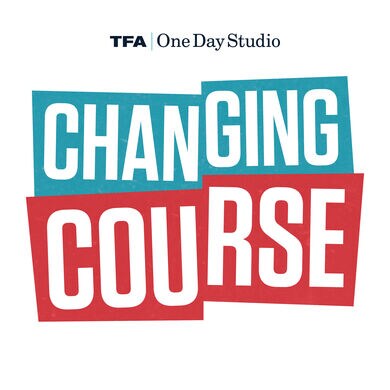
Changing Course: Seated At The Table
Host Jonathan Santos Silva reconnects with students and educators featured in the first season of Changing Course.
In this special bonus episode, host Jonathan Santos Silva gathers students and educators from season one of Changing Course for a live roundtable discussion about the power of student-staff partnerships, the impact of diversity and authentic cultural representation, and the importance of failure.
About the Show
Changing Course is a podcast from Teach For America’s One Day Studio that explores what’s possible when schools empower students in their own educational paths. Every episode, host Jonathan Santos Silva shares stories from students, teachers, and administrators about how they’ve reinvented traditional approaches to traditional education.
Meet the Host
Jonathan Santos Silva (South Dakota ‘10)
Jonathan Santos Silva is the Founding Executive Director of The Liber Institute and creator and host of The Bored of Ed, a podcast that amplifies the voices of inspiring BIPOC educators who are changing the face of education. He has provided technical support to South Dakota’s Native American Achievement Schools and has served as a school founder and principal, instructional coach, and education consultant.
Featured In This Episode
Hailey Ho, Student
Hailey is a proud multiracial (Native Hawaiian, Chinese, and Portuguese) student leader from Kapolei, Hawai‘i. Her ultimate career goal is to work for Pixar as a computer programmer to tell stories of different people. She believes she is a leader because she takes risks to pursue her passions. She is curious, has a growth mindset, and is willing to participate in new learning experiences.
Dana Haukaas, Principal, Todd County Middle School
Dana Haukaas is in her seventh year serving as principal of Todd County Middle School in Mission, South Dakota. Haukaas grew up in Todd County and is heavily invested in seeing the the community thrive in a post pandemic world.
Andrew Spector, Co-Founder and Program Director of Tulsa Changemakers
Andrew Spector (Greater Tulsa ’15) is co-founder and program director of Tulsa Changemakers, a youth leadership development and action organization. Since its founding in 2016, Tulsa Changemakers has hired, trained, and supported 62 educators to guide 627 students at 39 schools in Tulsa Public and Union Public Schools to plan, execute, and measure 120 community impact projects. Andrew started Tulsa Changemakers as a Teach For America corps member teaching 6th grade in Tulsa Public Schools. He and his co-founder incubated Tulsa Changemakers under the nonprofit umbrella of Leadership Tulsa, working there as program managers.
Jamilah Bullock, Lead Designer, 11th & 12th Grade Experiences
Jamilah serves as the Lead Designer for 11th & 12th Grade Experiences at North Edgecombe High School where she designs and implements key learning experiences for juniors and seniors. Additionally, she supports teachers across all content areas in curriculum planning and social-emotional learning and engagement. Previously, she served as the Coordinator of the North-Phillips School of Innovation Micro School and as an assistant principal of grades 6-12. She also served as an Impact Leader with Profound Ladies, an organization that equips women educators of color with the mentorship, training, leadership and career development pathways so their students will experience the impact of a thriving woman of color leading their education. In 2020, she was nationally recognized by the Leadership for Educational Equity as a BIPOC Emerging Policy and Advocacy Leader.
Katie Rodriguez, Student
Katie is a recent graduate of the Met High School in Providence, RI. She is interested in pursuing the medical field. In her time at the Met she has earned various certifications including CPR, AED, CNA, EMT and is about to start a phlebotomy certification course as well. Katie plans to work in these certification areas while pursuing her dream of becoming a neonatal nurse.


